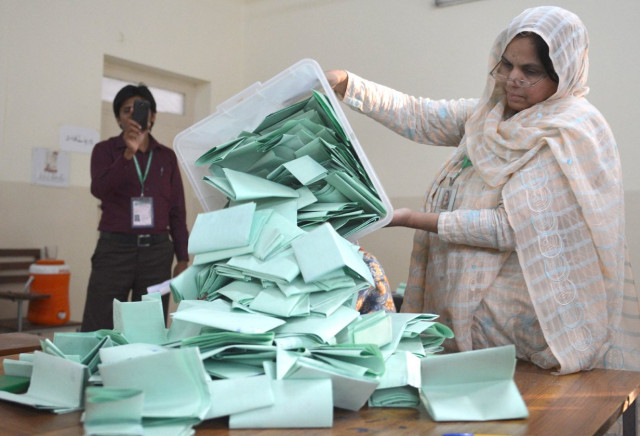Top polling body set to get more powerful
Contempt of court powers to help ECP punish officers defying its orders

PHOTO: AFP
In what may turn out to be an important move to augment its authority, the country’s top electoral body is to get contempt of court powers similar to that of a high court.
The Election Commission of Pakistan (ECP) – a constitutional body – enjoys many judicial powers but there had always been an ambiguity when it came to the execution of its orders in case any individual or an organisation defied directives.
The commission, comprising one former Supreme Court judge as its head and four retired high court judges, draws powers from Article 220 of the Constitution that states: “It shall be the duty of all the executive authorities in the federation and in the provinces to assist the commission in the discharge of it functions.”
LG polls: ECP agrees to amend schedule for last phase
This provision binds all organisations to follow ECP orders. Theoretically, it is assumed the election body has powers equal to a high court. The relevant clauses of the law, however, do not mention what if an organisation or an individual does not follow its directions.
To remove this ambiguity, the parliamentary electoral reforms committee has decided to adopt a new clause in the Constitution, giving the ECP contempt of court powers equal to that of a high court, as stated in Clause 2 of Article 204 of the Constitution.
The clause states: “A court shall have the powers to punish any person who: (a) abuses, interferes with or obstructs the process of the court in any way or disobeys any order of the court; (b) scandalizes the court or otherwise does anything which tends to bring the court or a judge into hatred, ridicule or contempt; (c) does anything which tends to prejudice the determination of a matter pending before the court; or (d) does anything, which, by law, constitutes contempt of court.
Only the superior judiciary – high courts and the apex court – enjoy these powers, which is enunciated in Clause 1 of Article 204.
Once the same powers are extended to the ECP, it would be in a position to punish anyone defying its orders. Similarly, the commission would now be able to punish government officials of other departments working for the body if they are found involved in any malpractices on election duty.
The ECP hires the services of government officials from other departments during elections.
LG elections: MQM accuses Sindh govt of pre-poll rigging
At the time of an election, these officers – returning officers, presiding offers and polling officers – are practically in charge of the entire election process on ground. In the existing legal framework, in case of a complaint against any offer, the ECP has to refer the matter to the parent department of the offer and cannot take any action directly.
After the new legal framework comes in place, the commission would be authorised to suspend officials involved in malpractices and in case of gross misconduct, terminate them from service. Those convicted by the ECP would be allowed to appeal in the Supreme Court only.
The sub-committee of the parliamentary committee on electoral reforms in its in-camera sessions has endorsed these proposals. It would inculcate them in the proposed reforms package it is preparing. Once the package is finalised, it would be sent to parliament for the final approval.
Published in The Express Tribune, October 24th, 2015.



















COMMENTS
Comments are moderated and generally will be posted if they are on-topic and not abusive.
For more information, please see our Comments FAQ